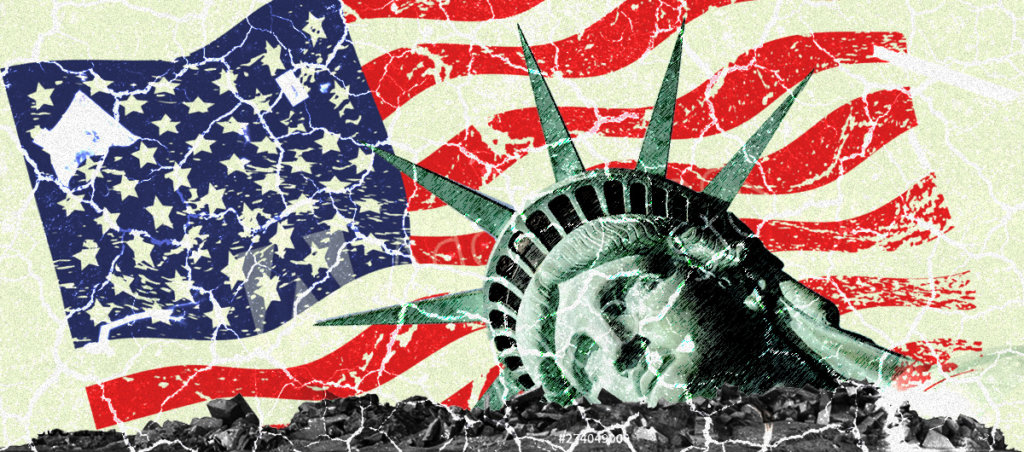If the insurrection asks what we’ve become as a nation, the acquittal of Trump answered it.
This article was made possible because of the generous support of DAME members. We urgently need your help to keep publishing. Will you contribute just $5 a month to support our journalism?
With the acquittal of Donald J. Trump on the charge of inciting an insurrection, the Republican Party finally pushed the government of the United States past the tipping point. For all that we have endured in the Trump Era—the surprise and horror of his victory in 2016; the dismay and fear of the white supremacy he encouraged; the deprivation, death, and suffering caused by his administration’s depraved and corrupt indifference—the GOP ensured that it was Trump’s departure that broke us.
If the January 6th insurrection asked the question of what we had become as a nation, the inevitability of Republican acquittal answered it. Evidence, facts, and even their own lived experience ceased to matter as they argued against Trump’s culpability. Responsibility and accountability lost all sense of meaning as Mitch McConnell deliberately stalled a trial to provide his caucus with the excuse that such a trial was unconstitutional. The machinations of Senate Republicans did not rebuke the vicious mob that had come to destroy the Capitol; they represented it.
The mob lived in an alternate universe of falsity and feeling; the GOP too shunned shared reality, meaningful facts, and the basics of common knowledge in exchange for affectation and allegiance. The mob claimed a right to its own rule, and congressional Republicans put that claim above the rule of law. The mob sought hostages from members of Congress and their staffers; in promising to stall the necessary business of the nation if the trial continued any further, Republican senators successfully made a hostage of the country. The mob didn’t dissipate or disperse as Congress resumed its duties; it cleaned itself up and put on a suit and tie.
And just like that, our fragile democracy shattered.
We are in a place beyond ideology or rhetoric, beyond agreement and disagreement. We have a government where one side has consecrated violence against the other, where we no longer have any shared frame of reference for reality, where nothing is too much. There are no rules left in politics; no limits to the powers of elected office; no responsibilities to the people or to the country, only to the self. Simply, there can be no point to negotiating relief packages or infrastructure spending with colleagues who would happily watch you die, if not do the deed themselves.
There is no way forward once one side of a nation disagrees with the other’s existence. Despite the effort to turn to the pressing business of running the country, Democrats seem to realize the nature of this truth. To engage with Republicans is to submit to the lies, the violence, the mob; to reject them is to feed the narratives of their alternate reality, confirm their imagined oppression, and further inflame their brutal rage. This is the paradox our shambolic government now represents.
We have come to the natural conclusion of decades of viciousness and permission, abuse and acceptance. Relentlessly, Republicans have crossed line after line: using the powers of the presidency to carry out personal vendettas and sabotage political opponents; explicitly ignoring Congress to negotiate with hostage-taking terrorists to give unauthorized funds to fascist paramilitary groups; initiating the longest government shutdown yet for a personal slight; actively misleading Congress and the country at large about threats to national security to justify preemptive war; coordinating with a foreign power (willingly or by extortion) to interfere in the election of the President of the United States. In response, our system of government chose comity over consequence, allowing the perpetrators and enablers to bury, dismiss, and pardon their own crimes, if not rehabilitate their reputations. Over and over again, Republicans would engage in outrageous, damaging, and even calamitous behavior, and without punishment, break some new barrier of democracy. Over and over again, our system would leave judgments to history.
We are left in the ruins of a young democracy we would not defend because we collectively feared the cure more than the disease. Always, our system has chosen easy forgiveness over difficult justice, to move forward and seek false unity, to turn toward “real” issues while leaving the true problem intact. The longer we waited to impose consequences, the heavier those consequences became, until we had no tools left in the arsenal to meet the moment. In this way, acquittal was inevitable because impeachment was inadequate.
The scale of this splintered government is beyond our living memory, and yet we know we have been here before. We inherit the legacy of our predecessors’ limitations and aspirations, the tools they crafted but would not wield to respond to armed insurrection against popular government. Too many of our political ancestors feared the consequences of further accountability; too many decided that the memory of war was enough of a punishment. We live in the wake of their mistakes; we know better. Because even if Republicans have decided to push our government past the breaking point, we can still decide what it will cost them.
